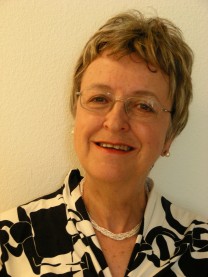Professor Dr. Brigitta Hauser-Schäublin was born in Switzerland, namely in Riehen near Basel. There she spent her childhood and youth. Her father was a tradesman running an international import-export company and furthermore took part in the local politics. Hauser-Schäublin had an early encounter with the topic of gender when being confronted with the female role in society and the difficulties for women to study. In order to take different directions she moved to Zurich when being a young woman, did several internships and took language classes. She also lived in London for half a year. After her return she started an apprenticeship at the local newspaper in Basel to become a journalist.
In this period Hauser-Schäublin also undertook her first journey to India, an experience which had a huge impact on her. When returning to Basel she not only worked as a journalist and finished her high school graduation but in 1969 also began her studies. After a brief phase taking courses on Religious studies Hauser-Schäublin focussed on studying Anthropology and Sociology. Alfred Bühler and Meinhard Schuster were among her teachers. In 1971 Hauser-Schäublin studied in Munich for a semester and after her return also took up an assistant position at the Ethnographic Museum in Basel, combining her growing anthropological knowledge with her skills as a journalist. A year later she joined a research project founded by Meinhard Schuster, regionally focussing on the Sepik region in New Guinea. Hauser-Schäublin took part in the expeditions and collected data on gender aspects, a work that 1975 culminated in her graduation thesis.
After graduation Hauser-Schäublin fully took up her work at the Ethnographic Museum in Basel, organizing a various number of exhibitions while trying out new conceptions as well as working in the public relations. She moreover did further research projects, e.g. on house-building in Papa New Guinea. In 1985 she completed her habilitation thesis. She gave academic lectures at the University in Basel and also worked on the Ethnographic Collection in Fribourg.
After being a visiting professor at the Department of Cultural and Social Anthropology in Cologne, Hauser-Schäublin in 1991/92 became a full professor at the Institute for Cultural and Social Anthropology in Göttingen, being the successor of Prof. Dr. em. Erhard Schlesier. There she not only gave various courses (e.g. on Gender and Religion) but also started to restructure the basic uni lectures. Furthermore the Institute joined the Department of Social Sciences. Her own scientific focus shifted from an early interest in Material Culture towards a closer look on theories and discourses. At the same time Hauser-Schäublin emphasized the importance of field research and did several of them herself, e.g. in Bali, Indonesia and Cambodia.
Short Portrait: Brigitta Hauser-Schäublin

Brigitta Hauser-Schäublin
 further information
further information

